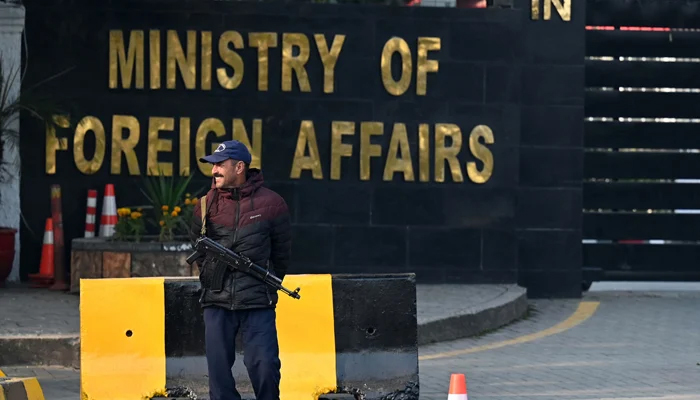Temple on site of razed mosque blot on India’s democracy: FO
Pakistan also urged Indian govt to ensure safety and security of religious minorities, including Muslims, their holy places
ISLAMABAD: Pakistan on Monday condemned the construction and consecration of the ‘Ram Temple’ on the site of the demolished Babri Masjid in the Indian city of Ayodhya.
A Foreign Office spokesperson said in a press statement that a temple built on the site of a demolished mosque would remain a blot on the face of India’s democracy for the times to come. Pakistan urged the international community to take cognizance of the growing Islamophobia, hate speech and hate crimes in India.
“The United Nations and other relevant international organisations should play their part in saving the Islamic heritage sites in India from extremist groups and ensuring protection of religious and cultural rights of the minorities in India,” the statement said.
Pakistan also urged the Indian government to ensure safety and security of religious minorities, including Muslims and their holy places.
The centuries-old mosque was demolished on December 6, 1992 by a mob of extremists. Deplorably, the spokesperson said, India’s superior judiciary not only acquitted the criminals responsible for the despicable act but also allowed the construction of a temple on the site of the demolished mosque.
“Developments of the last 31 years, leading to today’s consecration ceremony, are indicative of growing majoritarianism in India. These constitute an important facet of the ongoing efforts for social, economic and political marginalisation of the Indian Muslims,” the spokesperson said.
Notably, there was a growing list of mosques, including the Gyanvapi mosque in Varanasi and Shahi Eidgah mosque in Mathura, facing similar threat of desecration and destruction, it was added.
“The rising tide of Hindutva ideology in India poses a serious threat to religious harmony and regional peace. “The chief ministers of two major Indian states, Uttar Pradesh and Madhya Pradesh, are on record as citing the Babri Masjid’s demolition or inauguration of the Ram Temple as the first step towards reclaiming parts of Pakistan,” the spokesperson said.
Meanwhile, tension prevailed across India especially in Uttar Pradesh where the Ram temple was inaugurated at the site of demolished five centuries old Babri Masjid at Ayodhya. According to Kashmir Media Service (KMS), as building the temple had been part of BJP’s election strategy for decades, Muslim residents have sent their children and women to relatives in neighbouring towns after fearing attacks by Hindutva mob.
Some of the most senior religious leaders of Hindu sects boycotted the event. In an interview with the Newslaundry portal, Arshad Madani, president of the Deoband Muslim seminary, expressed similar fears. Speaking at the inaugural ceremony, Indian Prime Minister Narendra Modi said: “From today, from this sacred time, we have to lay the foundation for the next 1,000 years. By moving ahead of building the temple, now we all take the oath of building a national, capable, successful, beautiful, and divine India.”
India’s main opposition leaders skipped the inauguration of Ram Mandir, calling it a political stunt and a ploy for votes, particularly with the temple nowhere near being finished. A handful of Hindu head priests also avoided the event, saying that consecrating an unfinished temple goes against what’s in Hindu scriptures.
-
 ICE Agents 'fake Car Trouble' To Arrest Minnesota Man, Family Says
ICE Agents 'fake Car Trouble' To Arrest Minnesota Man, Family Says -
 Camila Mendes Reveals How She Prepared For Her Role In 'Idiotka'
Camila Mendes Reveals How She Prepared For Her Role In 'Idiotka' -
 China Confirms Visa-free Travel For UK, Canada Nationals
China Confirms Visa-free Travel For UK, Canada Nationals -
 Inside Sarah Ferguson, Andrew Windsor's Emotional Collapse After Epstein Fallout
Inside Sarah Ferguson, Andrew Windsor's Emotional Collapse After Epstein Fallout -
 Bad Bunny's Star Power Explodes Tourism Searches For His Hometown
Bad Bunny's Star Power Explodes Tourism Searches For His Hometown -
 Jennifer Aniston Gives Peek Into Love Life With Cryptic Snap Of Jim Curtis
Jennifer Aniston Gives Peek Into Love Life With Cryptic Snap Of Jim Curtis -
 Prince Harry Turns Diana Into Content: ‘It Would Have Appalled Her To Be Repackaged For Profit’
Prince Harry Turns Diana Into Content: ‘It Would Have Appalled Her To Be Repackaged For Profit’ -
 Prince William's Love For His Three Children Revealed During Family Crisis
Prince William's Love For His Three Children Revealed During Family Crisis -
 Murder Suspect Kills Himself After Woman Found Dead In Missouri
Murder Suspect Kills Himself After Woman Found Dead In Missouri -
 Sarah Ferguson's Plea To Jeffrey Epstein Exposed In New Files
Sarah Ferguson's Plea To Jeffrey Epstein Exposed In New Files -
 Prince William Prepares For War Against Prince Harry: Nothing Is Off The Table Not Legal Ways Or His Influence
Prince William Prepares For War Against Prince Harry: Nothing Is Off The Table Not Legal Ways Or His Influence -
 'How To Get Away With Murder' Star Karla Souza Is Still Friends With THIS Costar
'How To Get Away With Murder' Star Karla Souza Is Still Friends With THIS Costar -
 Pal Reveals Prince William’s ‘disorienting’ Turmoil Over Kate’s Cancer: ‘You Saw In His Eyes & The Way He Held Himself’
Pal Reveals Prince William’s ‘disorienting’ Turmoil Over Kate’s Cancer: ‘You Saw In His Eyes & The Way He Held Himself’ -
 Poll Reveals Majority Of Americans' Views On Bad Bunny
Poll Reveals Majority Of Americans' Views On Bad Bunny -
 Wiz Khalifa Thanks Aimee Aguilar For 'supporting Though Worst' After Dad's Death
Wiz Khalifa Thanks Aimee Aguilar For 'supporting Though Worst' After Dad's Death -
 Man Convicted After DNA Links Him To 20-year-old Rape Case
Man Convicted After DNA Links Him To 20-year-old Rape Case




